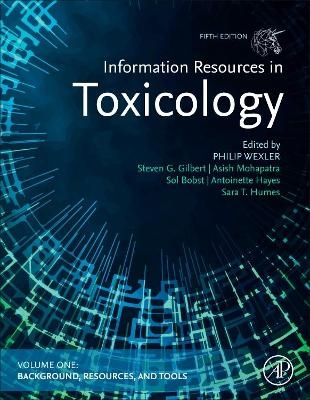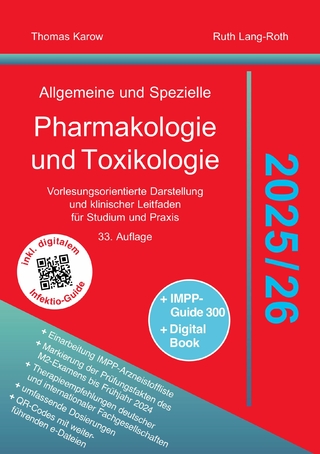
Information Resources in Toxicology, Volume 1: Background, Resources, and Tools
Academic Press Inc (Verlag)
978-0-12-813724-6 (ISBN)
Due to the increasing size of the hardcopy publication, the current edition has been divided into two volumes to make it easier to handle and consult. Volume 1: Background, Resources, and Tools, arranged in 5 parts, begins with chapters on the science of toxicology, its history, and informatics framework in Part 1. Part 2 continues with chapters organized by more specific subject such as cancer, clinical toxicology, genetic toxicology, etc. The categorization of chapters by resource format, for example, journals and newsletters, technical reports, organizations constitutes Part 3. Part 4 further considers toxicology’s presence via the Internet, databases, and software tools. Among the miscellaneous topics in the concluding Part 5 are laws and regulations, professional education, grants and funding, and patents. Volume 2: The Global Arena offers contributed chapters focusing on the toxicology contributions of over 40 countries, followed by a glossary of toxicological terms and an appendix of popular quotations related to the field.
The book, offered in both print and electronic formats, is carefully structured, indexed, and cross-referenced to enable users to easily find answers to their questions or serendipitously locate useful knowledge they were not originally aware they needed. Among the many timely topics receiving increased emphasis are disaster preparedness, nanotechnology, -omics, risk assessment, societal implications such as ethics and the precautionary principle, climate change, and children’s environmental health.
Philip Wexler has written and edited numerous publications related to toxicology and toxico-informatics, as well as taught and otherwise lectured globally on these topics. He has been Editor-in-Chief of Elsevier’s Encyclopedia of Toxicology including the current, 4th edition (2023) since its inception as well as Information Resources in Toxicology (Elsevier. 5th ed. 2020), and Chemicals, Environment, Health: A Global Management Perspective (CRC Press/Taylor and Francis. 2011). He has served as Associate Editor for Toxicology Information and Resources for Elsevier's journal, Toxicology and edited special issues on Digital Information and Tools. Phil is also overseeing a monographic series on Toxicology History. Volumes have been published on Antiquity, the Middle Ages and Renaissance, modern clinical toxicology, risk assessment, alternative test methods, food and nutrition, and disasters, with more in the planning stages. He is a co-Editor-in-Chief of the Taylor and Francis journal, Global Security: Health, Science, and Policy and a past recipient of the US Society of Toxicology’s (SOT) Public Communications Award. Phil recently retired from a long federal career as a Technical Information Specialist at the National Library of Medicine’s (NLM) Toxicology and Environmental Health Information Program, within its Specialized Information Services Division (SIS). His initial position at NLM was as a Fellow of its Associate Program and early work included a brief stint in the Reference Services Section. A recipient of the NLM Regents Award for Scholarly or Technical Achievement and the Distinguished Technical Communication Award of the Washington chapter of the Society for Technical Communication, he was team leader for the development of the ToxLearn online multi-module tutorials, a joint activity with the SOT. Phil had also been project officer for the LactMed file on drugs and lactation, and the IRIS (Integrated Risk Information System) and ITER (International Toxicity Estimates for Risk) risk assessment databases. Additionally, Phil had been the guiding force behind, and federal liaison to, the World Library of Toxicology, Chemical Safety, and Environmental Health (WLT) prototype, a free global Web portal that provided the scientific community and public with links to major government agencies, non-governmental organizations, universities, professional societies, and other groups addressing issues related to toxicology, public health, and environmental health prior to its migration to the INND/Toxipedia group. This multilingual tool, fed by information from a roster of international Country Correspondents, has been praised as a successful test resource for overcoming barriers to the sharing of information between countries, enhancing collaboration, and minimizing duplication. Currently on hiatus, it awaits a visionary funding source to become operational. A trustee of the Toxicology Education Foundation (TEF), Phil had previously served as its federal liaison. He is a past Chair of SOT’s World Wide Web Advisory Team, and active in its Ethical, Legal, Forensics, and Social Issues Specialty Section. He was a member of the Education and Communications Work Group of the CDC/ATSDR’s National Conversation on Public Health and Chemical Exposure. A co-developer of the Toxicology History Room, he is co-founder and was federal liaison to the Toxicology History Association. For many years he organized and emceed the popular Toxicology Quiz Bowl at the annual SOT meetings. In addition to pursuing toxicology-related activities in his retirement, Phil is happy to have more time to embrace other lifelong interests. He is the author of five poetry collections, a mosaic artist, and a cactus and succulent enthusiast.
Part I. Introduction 1. Toxicology: A Primer 2. History of Toxicology 3. Development of Toxicoinformatics 4. Toxicoinformatics Today 5. Starting Points for Finding Toxicology Resources
Part II. Subject Categorization: Books and More 6. General Texts 7. Analytical Tox 8. Animals in Research 9. Biomarkers 10. Biotechnology 11. Biotoxins 12. Cancer 13. Chemical Compendia 14. Chemicals: Cosmetics and Other Consumer Products 15. Children’s Environmental Health 16. Climate Change 17. Chemicals: Drugs 18. Chemicals: Dusts and Fibers 19. Chemicals: Metals 20. Chemicals: Pesticides 21. Chemicals: Solvents 22. Chemicals: Selected Chemicals 23. Clinical Toxicology 24. Developmental and Reproductive 25. Disaster Preparation & Management 26. Environmental Tox: Aquatic 27. Environmental Tox: Air 28. Environmental Tox: Hazardous Waste 29. Environmental Tox: Terrestrial 30. Environmental Tox: Wildlife 31. Epidemiology 32. Ethical Considerations 33. Exposure Science 34. Food and Nutrient Toxicology 35. Forensic Toxicology 36. Genetic Toxicology 37. Mixtures 38. Molecular, Cell., and Biochem Tox 39. Nanotechnology 40. Noise 41. Occupational Health 42. Omics 43. Pathology 44. Pharmacokinetics and Metabolism 45. Precautionary Principle 46. Radiation 47. Regulatory Tox 48. Risk Assessment 49. Substance Abuse 50. Target Sites: General 51. Target Sites: Cardiovascular 52. Target Sites: Endocrine 53. Target Sites: Gastrointestinal 54. Target Sites: Hematopoietic 55. Target Sites: Immune 56. Target Sites: Kidney 57. Target Sites: Liver 58. Target Sites: Nervous System 59. Target Sites: Respiratory 60. Target Sites: Sensory 61. Target Sites: Skin 62. Terrorism and Warfare (Chemical, Biological and Rad) 63. Testing Methods & Tox Assess (incl Alternatives) 64. Veterinary Tox
Part III. Other Resources 65. Organizations 66. Journals and Newsletters 67. General Interest and Popular Works 68. Technical Reports and Government Information 69. Audiovisual and Non-Print Resources
Part IV. The Online Environment and Data Science 70. The Internet: Recent Trends 71. Web-Based Databases 72. Software Tools for Tox & Risk Assess
Part V. Special Topics 73. Laws and Regulations 74. Hazard Communication 75. Professional Education 76. Public Education 77. Grants and Funding 78. Poison Control Centers 79. Patents
| Erscheinungsdatum | 09.08.2019 |
|---|---|
| Mitarbeit |
Chef-Herausgeber: Philip Wexler |
| Verlagsort | San Diego |
| Sprache | englisch |
| Maße | 216 x 276 mm |
| Gewicht | 3060 g |
| Themenwelt | Studium ► 2. Studienabschnitt (Klinik) ► Pharmakologie / Toxikologie |
| ISBN-10 | 0-12-813724-X / 012813724X |
| ISBN-13 | 978-0-12-813724-6 / 9780128137246 |
| Zustand | Neuware |
| Informationen gemäß Produktsicherheitsverordnung (GPSR) | |
| Haben Sie eine Frage zum Produkt? |
aus dem Bereich


